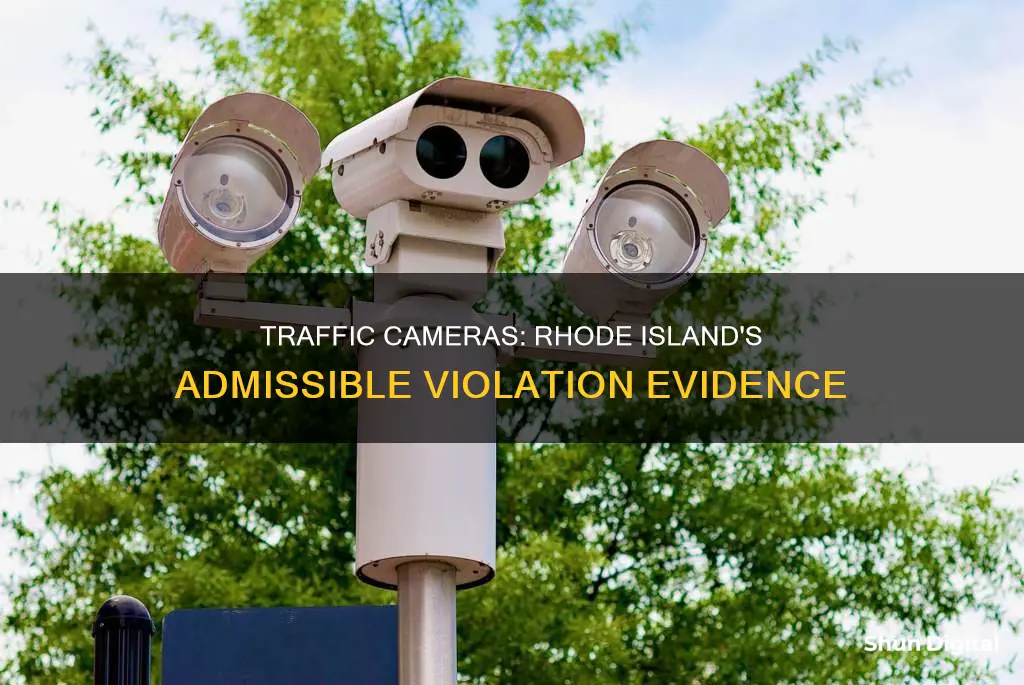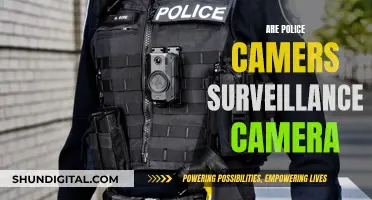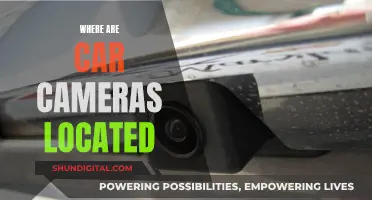
Traffic cameras in Rhode Island have sparked controversy, with critics arguing that they infringe on civil liberties and are primarily a source of revenue rather than a tool for public safety. The use of traffic cameras for enforcement raises concerns about due process, as the burden of proof is placed on the vehicle owner or lessee, regardless of who was driving. The involvement of private, for-profit vendors and the potential for mass surveillance further complicates the issue. While supporters argue that traffic cameras improve road safety and reduce accidents, the high cost of citations and the financial gains for cities and vendors have led to accusations of a money grab. The legality of speed camera contracts in Rhode Island has also been questioned, with potential violations of state law regarding the compensation structure for vendors.
| Characteristics | Values |
|---|---|
| Location | Providence, Pawtucket, East Providence, and Central Falls |
| Camera Types | Speed and red-light cameras |
| Fines | $85 for a red-light citation, $50 for a speed camera citation |
| Revenue | $51 million in citations over two years |
| Vendors | Sensys Gatso Group, Conduent |
| Legal Issues | Due process concerns, potential violation of state law regarding vendor compensation |
What You'll Learn
- Speed and red-light cameras in Rhode Island are a lucrative business for cities and vendors
- The use of traffic cameras is a contentious issue, with critics arguing they infringe on civil liberties
- There are concerns about the legality of Rhode Island's speed camera contracts
- Traffic camera citations can be challenged in Municipal Court
- The effectiveness of traffic cameras in improving road safety and reducing accidents is debated

Speed and red-light cameras in Rhode Island are a lucrative business for cities and vendors
Speed and red-light cameras in Rhode Island have sparked a heated debate, with critics arguing that they are a lucrative business for both cities and vendors at the expense of citizens' rights and liberties. These cameras, scattered across East Providence, Pawtucket, Providence, and Central Falls, have been in place for years, enforcing traffic laws and issuing hefty fines.
The financial aspect of these cameras is what has many people concerned. The cities pay private vendors a substantial amount per camera per month, and a fee for each citation issued. For example, Providence pays $2,978 per camera per month and $7.50 per citation, while Pawtucket and East Providence pay $2,500 per camera per month and $7.30 per citation. This financial arrangement has led to substantial revenue for both the cities and the vendors. Between October 2020 and October 2022, Pawtucket made over $21 million from 274,000 citations, with East Providence, Central Falls, and Providence also collecting significant sums. Over a two-year period, 14% to 16% of the total revenue from citations went to the out-of-state vendors operating the cameras.
While proponents of the cameras argue that they are effective in reducing accidents and improving public safety, critics counter that they infringe on civil liberties and introduce a form of mass surveillance. The automatic issuance of citations raises due process concerns, as the "burden of proof" is placed on the vehicle owner or lessee, regardless of who was driving. Additionally, there are questions about the validity and accuracy of the tickets issued, with many being thrown out in court for being defective.
The involvement of private, for-profit vendors in traffic enforcement has also been contentious. There is an incentive for these companies to maximise the number of cameras and their placement in areas where the most money can be made, rather than where they are needed for safety reasons. This prioritisation of profits over safety has been observed in other states as well, such as Iowa and California.
The use of speed and red-light cameras in Rhode Island has undoubtedly generated significant revenue for both the cities and the vendors operating the cameras. However, the debate surrounding their implementation and impact on citizens' rights and liberties remains ongoing.
Connecting Kodak EasyShare Camera to Your Computer
You may want to see also

The use of traffic cameras is a contentious issue, with critics arguing they infringe on civil liberties
In Rhode Island, speed and red-light cameras have been installed in several cities, including East Providence, Pawtucket, Providence, and Central Falls. These cameras are designed to catch drivers who disobey the law and issue them with fines. While supporters argue that these cameras have led to a reduction in accidents and improvements in public safety, critics have a different view.
One of the main concerns raised by opponents of traffic cameras is the potential infringement on citizens' constitutional rights, particularly the right to privacy. The American Civil Liberties Union (ACLU) has expressed worries about the increased governmental observation and the potential abuse of data that comes with the use of these cameras. They argue that the implementation of traffic calming measures, such as speed bumps, would be a better alternative to ensure safety.
Additionally, there are concerns about due process. With camera-generated tickets, the "burden of proof" is placed on the owner or lessee of the vehicle, rather than the authorities having to prove that someone is at fault. This raises questions about the fairness of the process and the principle of being innocent until proven guilty.
Furthermore, the involvement of private, for-profit vendors in traffic enforcement has been criticised. There are incentives for these companies to maximise revenue from speeding tickets rather than prioritising safety. In Rhode Island, the city pays a private vendor a significant amount per camera, per month, and an additional fee per citation. This financial arrangement can create a conflict of interest and lead to an excessive focus on revenue generation rather than public safety.
The use of traffic cameras has also been associated with other negative consequences. For example, sending a citation days or weeks after a violation may negate the immediate benefit of an officer pulling someone over to prevent an accident. It also fails to address situations where someone is speeding due to being under the influence of drugs or alcohol.
While courts have generally upheld the constitutionality of traffic cameras, the debate continues, and some states have chosen not to implement them due to these concerns. The balance between public safety and individual rights remains a complex and contentious issue.
Streaming Your Camera to Your Computer: A Simple Guide
You may want to see also

There are concerns about the legality of Rhode Island's speed camera contracts
Rhode Island's speed camera law, passed in 2016, states that contracts between cities and vendors should be based on the value of the equipment and support services provided, and not on the revenue generated by the automated school-zone-speed-enforcement system. However, contracts between cities and vendors show that vendors take a fixed fee from each citation, which has raised concerns about the legality of these contracts.
The fixed fee per citation can be seen as a percentage of the total fine, which is what the law intended to avoid. NBC 10 Legal Analyst Mark Dana clarified that the statute states that payments to vendors must be based on the value of the equipment and not on any monies based on tickets. Despite this, cities with speed cameras argue that the fixed fee is to cover administrative costs and that they continue to pay this fee even if a citation is dismissed, so it is not based on profit.
The Rhode Island ACLU has raised concerns about the use of traffic cameras since 2004, citing issues with due process, the incentive for private companies to maximise revenue rather than prioritise safety, and the introduction of mass surveillance. They also highlight the case of Providence, which implemented speed cameras before the 2016 law was passed, and whose contract included language spelling out that the city would receive a certain amount per ticket.
The involvement of private, for-profit vendors in traffic enforcement has been a point of contention, with critics arguing that the cameras are a money grab rather than a public safety tool. While cities have generated millions of dollars in revenue from speeding fines, a significant portion of this money goes to the out-of-state vendors operating the cameras. For example, in Pawtucket, a speed camera near Burns Elementary School collected $2.4 million in fines over a two-year period, with 14-16% of that going to the vendor.
The legality of Rhode Island's speed camera contracts is questionable, given the discrepancy between the stated intent of the law and the actual implementation. The fixed fee per citation taken by vendors can be interpreted as a percentage of the total fine, which goes against the spirit of the law. The debate around the use of traffic cameras in Rhode Island continues, with concerns about civil liberties, public safety, and the role of private companies in law enforcement.
Smart Focus: How Cameras Autofocus with Precision
You may want to see also

Traffic camera citations can be challenged in Municipal Court
The process for challenging a traffic camera citation may vary depending on your location. In some places, such as Sacramento, California, you will receive a citation in the mail that includes a date to appear in court or pay the fine. You must either appear in person or resolve your case by the specified date. Failure to do so will result in additional penalties.
If you were not the driver of the vehicle when the citation was issued, you should contact the law enforcement agency that issued the citation. You may also obtain assistance from a clerk at the Traffic Public Counter or the Traffic Virtual Public Counter. Do not send payment to the court if you were not the driver, as the agency will need to correct the driver information.
It is important to note that there may be time limits for challenging a traffic camera citation. For example, in Maryland, you must comply with one of the options listed on the citation within 30 days of receiving it. These options may include paying the fine, requesting a payment plan, pleading "guilty with an explanation," or requesting a trial. If you do not respond within the specified time frame, your driver's license may be suspended.
When challenging a traffic camera citation, you may have the opportunity to present your side of the case and explain any extenuating circumstances. The judge will then make a decision, and you may have the right to appeal if you are found guilty. It is recommended to seek legal advice if you are unsure about your options or how to proceed with challenging a traffic camera citation.
The Ultimate Muscle Car Face-Off: Camaro vs Challenger
You may want to see also

The effectiveness of traffic cameras in improving road safety and reducing accidents is debated
The effectiveness of traffic cameras in improving road safety and reducing accidents is a highly debated topic. While some argue that they are an invasion of privacy and a means for private companies and local governments to make money, others insist that they are necessary for public safety and reducing accidents.
Traffic cameras have been the subject of much debate in Rhode Island, with some arguing that they are an effective tool for improving road safety and reducing accidents. For example, Pawtucket Police Maj. David Holden has stated that the cameras have led to a "drastic reduction" in speeding and red-light violations, as well as a decrease in accidents. He also noted that before the cameras were installed, speeding was a top complaint among residents, especially in densely populated areas with many pedestrians.
On the other hand, critics argue that traffic cameras are a money grab by private companies and local governments. In Rhode Island, for example, the cities of Pawtucket, East Providence, Central Falls, and Providence have made over $51 million from traffic camera citations in just two years, with 14-16% of that money going to out-of-state vendors. This has raised concerns about the role of private companies in traffic enforcement and the potential for conflicts of interest. Additionally, civil liberties groups have raised concerns about the due process implications of automatically issued citations, the lack of confirmation of delivery for mailed citations, and the potential for mass surveillance of motorists.
The effectiveness of traffic cameras in reducing accidents has been studied in various places, with mixed results. Some studies have found that speed cameras, in particular, are effective in reducing accidents and injuries. For example, a study in Barcelona, Spain, found that speed cameras installed on the city's beltway led to a 27% decrease in the number of road collisions and a similar reduction in the number of people injured. The study also found that the effects were greater during weekend periods when traffic flows were lighter. Similarly, a systematic review of 14 observational studies found that all but one of the studies showed the effectiveness of speed cameras in reducing collisions and casualties for up to three years after their introduction. The reductions in collisions ranged from 5% to 69%, while injuries were reduced by 12% to 65%.
However, other studies have found no significant effect of speed cameras on the number of motor vehicle collisions. For example, a study in Phoenix, Arizona, examined the effects of speed cameras along a 26-mile segment of interstate highway and found no independent impact on the incidence of motor vehicle collisions, neither when the cameras were placed nor when they were removed. The study controlled for multiple confounding variables, including traffic volume fluctuations, seasonal changes, and the halo effect, which refers to the continued effect of a camera even after it is passed or removed.
In conclusion, while traffic cameras are often touted as a public safety measure, the debate around their effectiveness in improving road safety and reducing accidents is nuanced. While some studies and local officials claim that they lead to significant reductions in accidents and injuries, particularly in densely populated areas, other studies and critics argue that they are primarily a revenue-generating tool that may infringe on civil liberties. More rigorous and controlled studies are needed to fully understand the effects of traffic cameras on road safety, especially over the long term.
Are Enterprise Rental Cars Equipped With Cameras?
You may want to see also
Frequently asked questions
Yes, traffic cameras are admissible for violations in Rhode Island.
Rhode Island uses speed and red-light cameras.
Traffic cameras are located in Providence, Pawtucket, East Providence, and Central Falls.
There are several concerns regarding the use of traffic cameras in Rhode Island, including due process concerns, issues with delivery and receipt of citations, privacy rights, and the financial incentives for private companies involved in traffic enforcement.







